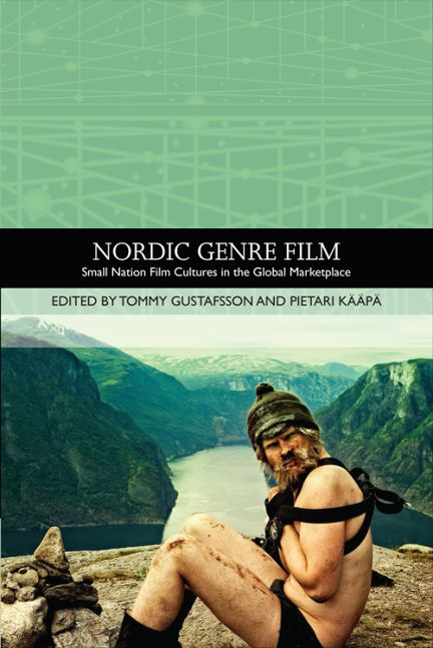Book contents
- Frontmatter
- Contents
- List of Illustrations
- List of Contributors
- Traditions in World Cinema
- Introduction: Nordic Genre Film and Institutional History
- PART I HERITAGE CINEMA AND NATIONAL NARRATIVES
- 1 Sibelius and the Re-emergence of the Great Man Biopic
- 2 Whose Repressed Memories? Max Manus: Man of War and Flame–Citron (from a Swede's Point of View)
- 3 Voices from the Past – Recent Nordic Historical Films
- PART II CRIME AND DETECTIVE NARRATIVES
- PART III NORDIC OPTIMISM: ROAD MOVIES, COMEDIES AND MUSICALS
- PART IV NORDIC HORRORS
- PART V GENRE BENDERS
- Index
2 - Whose Repressed Memories? Max Manus: Man of War and Flame–Citron (from a Swede's Point of View)
from PART I - HERITAGE CINEMA AND NATIONAL NARRATIVES
Published online by Cambridge University Press: 25 October 2017
- Frontmatter
- Contents
- List of Illustrations
- List of Contributors
- Traditions in World Cinema
- Introduction: Nordic Genre Film and Institutional History
- PART I HERITAGE CINEMA AND NATIONAL NARRATIVES
- 1 Sibelius and the Re-emergence of the Great Man Biopic
- 2 Whose Repressed Memories? Max Manus: Man of War and Flame–Citron (from a Swede's Point of View)
- 3 Voices from the Past – Recent Nordic Historical Films
- PART II CRIME AND DETECTIVE NARRATIVES
- PART III NORDIC OPTIMISM: ROAD MOVIES, COMEDIES AND MUSICALS
- PART IV NORDIC HORRORS
- PART V GENRE BENDERS
- Index
Summary
In 2008, both Norway and Denmark delivered major contributions to the cinematic genre of the ‘occupation drama’ (Norwegian), or ‘occupation film’ (Danish): the Norwegian film was Max Manus: Man of War (Max Manus, Joachim Ronning and Espen Sandberg, 2008) and the Danish Flame & Citron (Flammen og citronen, Ole Christian Madsen, 2008). In Scandinavia, these generic markers refer to many films set during the Second World War and depicting the fates of Danes and Norwegians in the years 1940–5, when their respective countries were occupied by Nazi Germany. Thus, both Norway and Denmark eventually came to be on the victorious allied side of the war.
The other Nordic countries had different obligations. Finland was between 1941 and 1944 fighting on the side of Nazi Germany in a savage war against the Soviet Union. This struggle was bound to be lost, and Finland came to switch sides in 1944, making peace with the Soviets and agreeing to evict a German army in northern Finland by military force. Sweden, most importantly in the present context, was neutral and kept its independence throughout the war. This chapter will study how Max Manus: Man of War and Flame & Citron can be understood in a Swedish context, referring to Swedish history during the war, textual analyses of mainly the scenes from Sweden in the films, and the reception of the films in Sweden. That is, I analyse Norwegian and Danish perceptions of Sweden during the war, but strictly from a Swede's point of view.
It should be noted that films about the occupation of Norway and Denmark have been very common particularly in Norway, where the occupation drama has flourished and evolved in the cinema since 1946, including classics like the docudrama Kampen om tungtvannet (Titus Vibe-Muller and Jean Dreville, 1948) and the artistically refined Kalde spor (Arne Skouen, 1962) (Iversen 2011: 145–55). In Denmark, the first occupation film, Den usynlige hær (Johan Jacobsen, 1945) came shortly after the liberation, and the genre peaked in the early 1990s, with films like Drengene fra Sankt Petri (Soren Kragh- Jacobsen, 1991) (Schepelern, 2001: 136, 327). Few films, however, can match the domestic successes of Max Manus: Man of War or Flame & Citron.
- Type
- Chapter
- Information
- Nordic Genre FilmSmall Nation Film Cultures in the Global Marketplace, pp. 33 - 46Publisher: Edinburgh University PressPrint publication year: 2015



